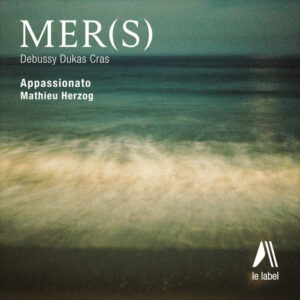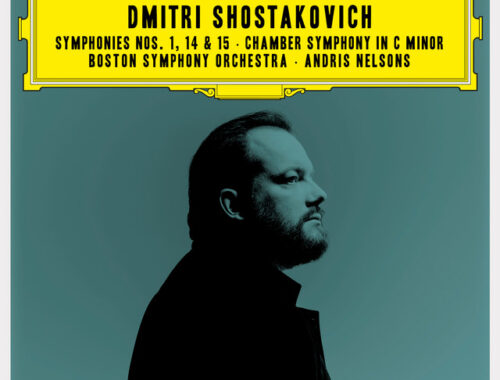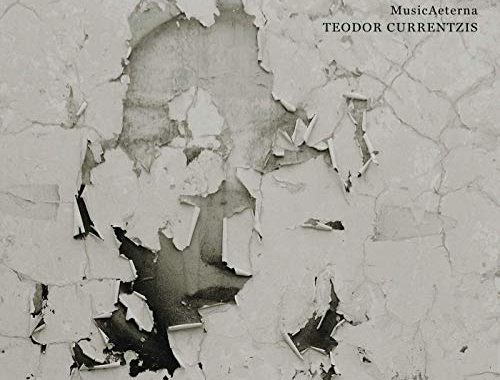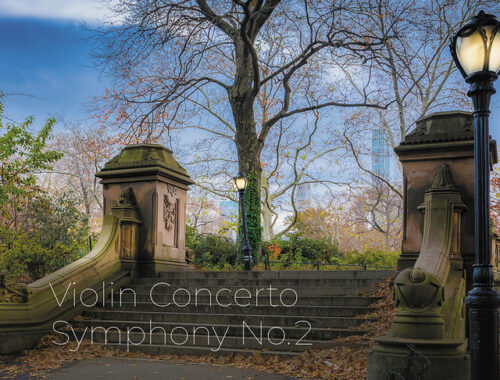GRAMOPHONE Review: MERS(S) Debussy Dukas Cras – Appassionato/Herzog
 The concept behind Mathieu Herzog’s Appassionato would seem to me to be one of chamber music (and the mindset implicit in that) transcending the number of players involved – a free and flexible approach with infinite possibilities. And now with their own label comes artistic freedom, too. The title Mer(s) made me smile. Alongside Debussy – whose musical portraiture of the ocean is the first Mer to come to mind – is set alongside a very close relative in musical terms from a composer completely unknown to me: Jean Cras. Who he? A pretty much forgotten Frenchman (20th century) whose relationship with the sea was entirely professional. He was a career naval officer. His orchestral work Journal de Bord is quite a piece and a significant head-start for this album.
The concept behind Mathieu Herzog’s Appassionato would seem to me to be one of chamber music (and the mindset implicit in that) transcending the number of players involved – a free and flexible approach with infinite possibilities. And now with their own label comes artistic freedom, too. The title Mer(s) made me smile. Alongside Debussy – whose musical portraiture of the ocean is the first Mer to come to mind – is set alongside a very close relative in musical terms from a composer completely unknown to me: Jean Cras. Who he? A pretty much forgotten Frenchman (20th century) whose relationship with the sea was entirely professional. He was a career naval officer. His orchestral work Journal de Bord is quite a piece and a significant head-start for this album.
But first to the Debussy which seems to me to rejoice in the chamber music sensibility of both performers and music. The overriding sense here is one of a soloistic character where inner-parts really catch the ear (and the light) and rhythmic flexibility is all. I hesitate to use the word ‘fluidity’ (for obvious reasons) but you have only to listen to the passage for divisi cellos in the first tableau to know exactly what I mean. I think is is the middle tableau ‘Jeu de vagues’ where the philosophy of both conductor and players really comes into its own. It is, in a word, scintillating. Wonderfully rhythmic with crystal clarity throughout the texture and with such freedom as to make even the portamento in the strings naturally sway and swing.
The inky squalls of the final tableau are again heightened by rhythm and cross-rhythm all creating an urgency that today’s super-sized symphony orchestras sometimes struggle with. The climax of the piece with its big cornet-led chorale is impassioned without being portentous.
And so to the album’s real selling-point – the exhumation of Jean Cras’ Journal de Bord (1927) which like the Debussy (whose influence almost goes without saying) is in three panels with their own time-stamp and implied location. The rapture and wonder of the piece, though, is entirely Cras’ own. The grandeur and reach of the first movement is truly oceanic – the tunes are lush and the orchestration rich. There is a flute and clarinet led pastorale (second movement), sensuous and becalmed, and the jubilant finale is tinged with the Eastern influence encountered on Cras’ travels. A welcome discovery.
So where does Dukas’ L’apprenti Sorcier fit in? Ah, water. Flooding. The spell that goes wrong. Who needs an excuse to add it anyway. Herzog and his players romp through it, rejoicing in the chaos for the orgiastic dance that it is. I especially enjoyed excessively grumpy contrabassoon and those flashing piccolo-bright woodwinds. The trick of the piece is that it feels out of control and yet not. And it does. Super disc.

VOCAL HEROES: BARBRA STREISAND
You May Also Like

GRAMOPHONE Review: Shostakovich Symphonies 1, 14, & 15 Boston Symphony Orchestra/Nelsons
12/08/2021
GRAMOPHONE Review: Mahler Symphony No. 6 – MusicAeterna/Currentzis
02/01/2019